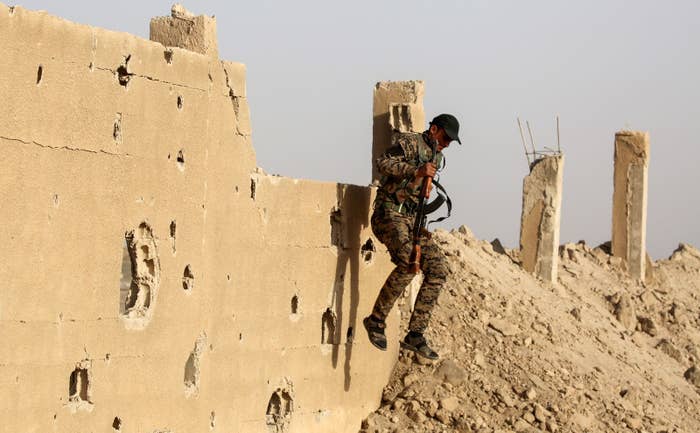
The US military plans to release a Saudi-American dual citizen suspected of fighting for ISIS at an undisclosed location in Syria, according to a new court filing Wednesday night.
The unnamed person, identified as “John Doe” in legal documents, has been detained in Iraq as an enemy combatant since September and has been the subject of a legal battle over whether the US military had the right to hold him. But on Wednesday, the Justice Department told the court that it planned to release him “no sooner than 72 hours” after the filing, “either in a town or outside an Internally Displaced Person camp.”
The unusual move came after federal courts ruled that he could not be forcibly sent from Iraq, where he is in US custody, to another country that was not disclosed in court proceedings but is reportedly Saudi Arabia.
The American Civil Liberties Union has been challenging his detention since September, while the Pentagon insisted that it was holding the man legally. The ACLU released a statement saying it plans to challenge the government’s release plan.
“The government has effectively admitted that it has no reason to continue detaining our client and that he does not pose a threat,” Jonathan Hafetz, an ACLU attorney, said in the statement.
“But, instead of offering a safe release, they want to dump an American citizen onto the side of the road in a war-torn country without any assurances of protection and no identification,” he said.
Pentagon officials, who previously referred questions to the Justice Department, declined to comment on the decision. A Justice Department official did not immediately return a request for comment.
The detainee was turned over to the US last September by the Syrian Democratic Forces, the Pentagon-backed militia fighting ISIS in Syria. The government said in court filings that John Doe served as a fighter for ISIS, among other roles. When he was captured by SDF fighters, he had a snorkel and diving mask, a Qur'an, a GPS device, and more than $4,000 in cash, the court filings say. The latter two were “both…recognized by the SDF as marks of an ISIL fighter, not a civilian,” the filings said. He had also been listed as a “fighter” in a separate document obtained by the US, according to the filings.
He reportedly sought press credentials and offered to write news reports on the war in Syria, according to court filings.
“Petitioner claimed that he intended to enter Syria to be a freelance writer and that he obtained press credentials from the [redacted] using his US passport, as well as from other press outlets,” an FBI agent wrote in a filing unsealed in February as part of a legal challenge by the ACLU. The filing said he entered Syria in January 2015 with $40,000 after being smuggled from Turkey.
The ACLU argued that the US military did not have the legal authority to keep ISIS fighters in military detention under war powers provided under the 2001 Authorization for the Use of Military Force, which Congress passed after the Sept. 11 attacks.
No judge has ruled yet on the lawfulness of John Doe's detention, but the government faced setbacks in court in recent months. The notice from the Justice Department on Wednesday came a month after a federal appeals court in Washington, DC, upheld a lower court order that blocked the administration from transferring Doe — over his objections — to the custody of another country.
The Justice Department argued it had the right to transfer Doe before he could challenge his detention in a US court, and that a transfer was akin to what he was asking for — release from US custody. John Doe's lawyers at the ACLU countered that the government's ability to forcibly transfer Doe stemmed from the fact that it was holding him in the first place, so he should first have the opportunity to contest his detention.
US District Judge Tanya Chutkan in Washington had ordered the government to give 72 hours’ notice before it planned to transfer Doe. In the midst of appealing that order, the government filed notice in mid-April that it planned to move him. After hearing arguments, Chutkan blocked the move, and the Justice Department appealed.
The DC Circuit upheld both of Chutkan's orders in a 2–1 decision in early May. The court found there was no law or treaty that gave the US the authority to forcibly transfer a US citizen to another country. And if the US deemed a US citizen an enemy combatant, there had to be a legal inquiry into the nature of the conflict and a chance for the citizen to challenge their enemy designation before they could be forcibly transferred, the court concluded.
“While we sustain the district court’s orders, we do so respectful of — and with appreciation for — the considerable deference owed to the Executive’s judgments in the prosecution of a war. That latitude of course extends to military decisions about what to do with enemy combatants captured overseas in a zone of active hostilities. Virtually all such decisions will be unaffected by our decision today,” Judge Sri Srinivasan wrote in the majority opinion. “But when an alleged enemy combatant — even one seized on a foreign battlefield — is an American citizen, things are different.”


